Chinese dictator Xi Jinping will attend the Asia-Pacific Economic Cooperation (APEC) summit in San Francisco next week and is scheduled to be the guest of honor at a dinner attended by hundreds of U.S. executives and business leaders.
China has yet to formally announce Xi’s participation, but the Biden administration has hinted several times that it expects him to be in San Francisco, and President Joe Biden might meet with him there. Two senior administration officials repeated this tease on Friday, saying the second face-to-face meeting between Xi and Biden would occur at the APEC summit on November 15.
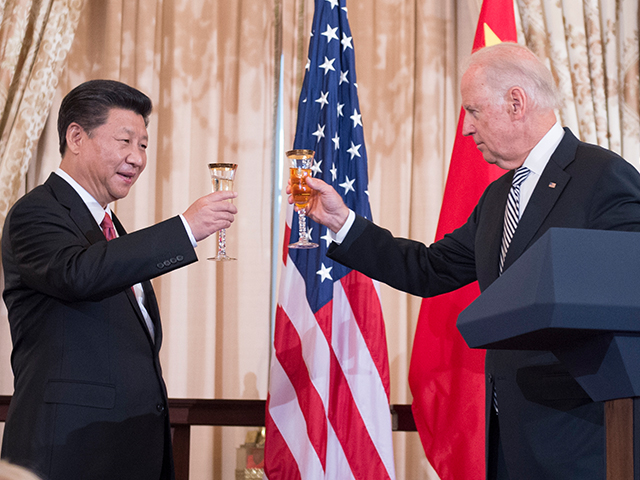
Then-U.S. Vice President Joe Biden raises his glass to toast Chinese President Xi Jinping at a State Luncheon in the Chinese president’s honor at the U.S. Department of State in Washington, DC, on September 25, 2015 (U.S. State Department/Flickr).
“High on the list of priorities for Xi during his U.S. visit is calming foreign investors. Recent surveys show western executives in China are increasingly nervous about doing business there, due to a growing list of headaches ranging from geopolitical tensions and a slowing economy to detention of employees,” Bloomberg News reported on Tuesday.
Foreign investors are indeed nervous, especially after a rash of abrupt disappearances among high-level Chinese executives. Xi’s genocidal tyranny prefers to stuff people accused of crimes in jail without warning and hold them incommunicado for weeks or months before revealing what they were charged with.
Such a fate has befallen several well-connected Chinese billionaires, to the consternation of their Western business partners. America’s Warren Buffett has been involved in a few political controversies over the years. China’s “Warren Buffet,” Zhao Bingxian, just got dragged off in the middle of the night without warning, leaving his giant pharmaceutical company to stammer that it has nothing to do with whatever its chairman has been accused of doing.
These disappearances, coupled with raids and crackdowns that have directly affected foreign business operations, are making overseas investors quietly determined to continue with “de-risking” their supply chains away from China.
Xi orchestrated a massive propaganda campaign to make it seem as though the Wuhan coronavirus pandemic and China’s human rights abuses have been forgotten, and no one of substance was still talking about decoupling their business interests from his regime. Then, suddenly, the September quarterly reports dropped, and China had suffered the first net decline in foreign investment in its modern history. Perhaps foreign executives sought to avoid antagonizing Xi’s thin-skinned regime by talking about de-risking less, but they were quietly doing it.
The decline in foreign investment occurred even though Beijing spent the past year wining and dining numerous top executives, from Apple CEO Tim Cook to Elon Musk. Xi’s hope is evidently that Biden would like to smooth out U.S.-Chinese relations in the hope of goosing the American economy before the 2024 presidential election, and China desperately needs foreign cash to arrest an economic slowdown, which is more severe than Xi expected.
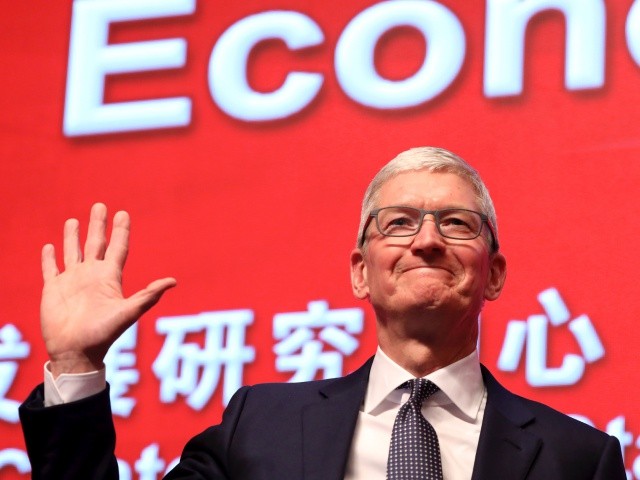
Apple CEO Tim Cook waves as he arrives for the Economic Summit held for the China Development Forum in Beijing on March 23, 2019.(Photo by Ng Han Guan / POOL / AFP) (Photo credit should read NG HAN GUAN/AFP via Getty Images).
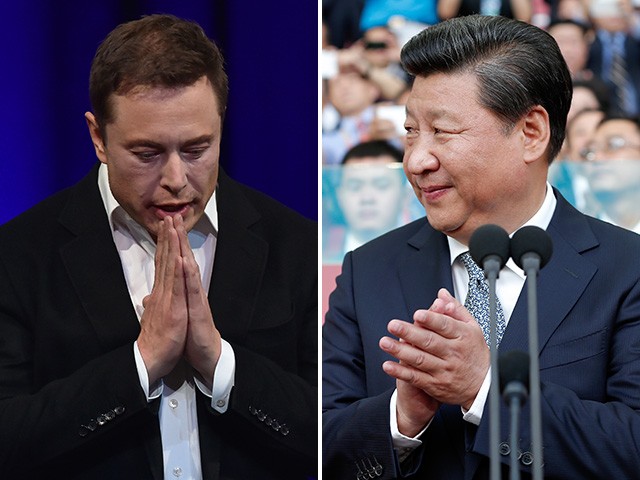
Elon Musk – CEO of Tesla, SpaceX, and the Boring Company, and Chinese president/emperor Xi Jinping (Peter Sparks/AFP/Getty, Lintao Zhang/Getty Images for IAAF).
Forbes additionally expected Xi to talk up solar power, an industry China utterly dominates even though the Chinese themselves rely on coal power for their workhorse industrial needs:
China is installing about as many solar panels and wind turbines as the rest of the world combined, and is on track to meet its target for clean energy six years early according to Fitch Ratings. Renewable-power capacity additions in China reached 109 gigawatts (GW) in 1H23, equivalent to 71% of the total power capacity that was newly installed in 2022. To put things in perspective at the end of 2022, there was 110 GW of solar photovoltaic (PV) and over 144 GW of wind power total in America. Solar power in China contributed 78.42 (GW), as both large utilities-scale capacity and distributed solar capacity more than doubled.
However at the same time, China is also building new power plants that burn coal, the dirtiest of the fossil fuels, at a pace that dwarfs the rest of the world. In this regard, President Xi Jinping’s participation and address at the APEC CEO Summit bear significance, but also represents a conundrum in how best to reconcile China’s commitment to fostering a shared sustainable future, ensuring regional stability, and promoting global governance.
Forbes anticipated Xi would push the official Chinese Communist Party line that his government desires nothing more than “meeting international expectations and actively contributing to the prosperity and development of the region.”
This rings hollow when measured against China’s continuing use of forced labor; brutal oppression of minority populations; refusal to condemn Russia’s devastating war in Ukraine; bullying of smaller neighbors, such as the Philippines; embrace of the odious Taliban regime in Afghanistan; and ugly efforts to shield the terrorists of Hamas after the atrocities of October 7.
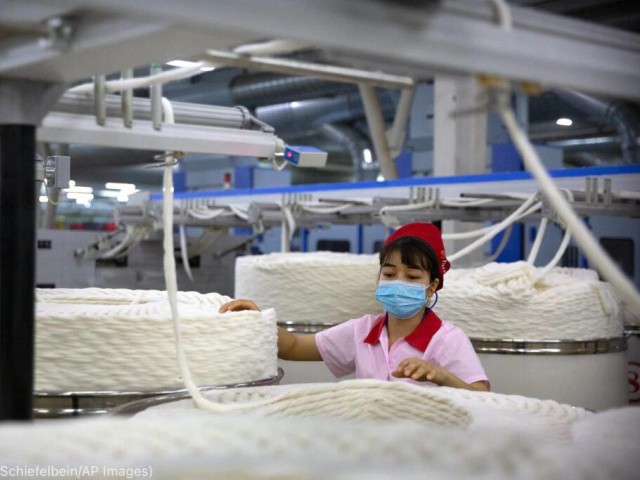
A worker watches as a machine processes cotton yarn at a Huafu Fashion plant, as seen during a government-organized trip for foreign journalists in Aksu in western China’s Xinjiang Uyghur Autonomous Region, Tuesday, April 20, 2021. A backlash against reports of forced labor and other abuses of the largely Muslim Uyghur ethnic group in Xinjiang is taking a toll on China’s cotton industry, but it’s unclear if the pressure will compel the government or companies to change their ways (AP Photo/Mark Schiefelbein).
The Biden administration and APEC nations will doubtless choose to ignore most or all of the above because their economic fates have become so closely entwined with China, and they have made themselves helplessly dependent on the solar panels and lithium batteries China provides, but they should have no illusions about China meeting any international expectations.
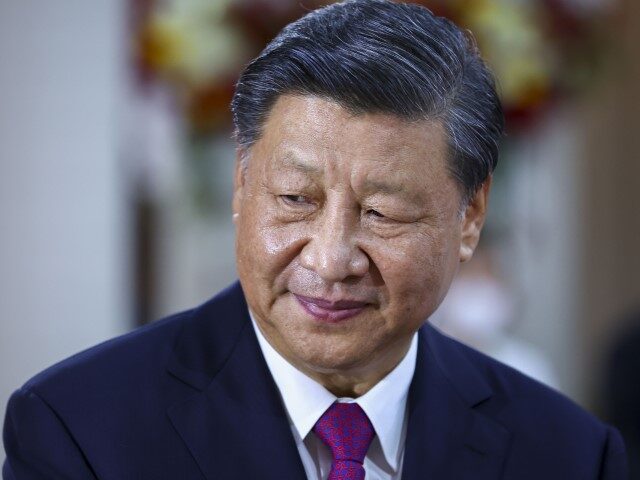
COMMENTS
Please let us know if you're having issues with commenting.